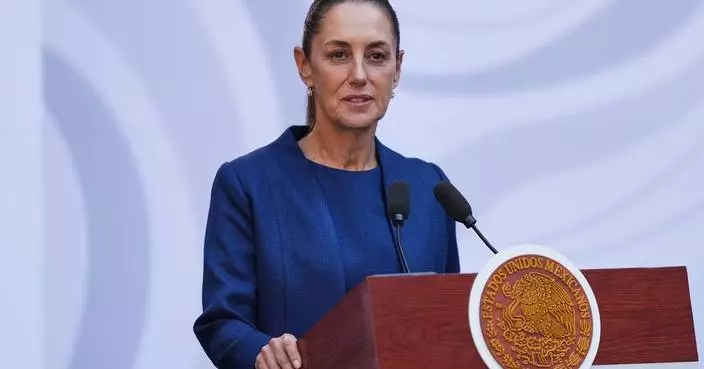Big Tech faced tough questions Tuesday as federal lawmakers focused on issues of potentially anticompetitive behavior by technology giants and expressed bipartisan skepticism over Facebook's plan for a new digital currency.
Companies such as Apple, Google, Facebook and Amazon have long enjoyed nearly unbridled growth and a mythic stature as once-scrappy startups — born in garages and a dorm room and a road trip across the United States — that grew up to dominate their rivals. But as they've grown more powerful, critics have also grown louder, questioning whether the companies stifle competition and innovation, and if their influence poses a danger to society.
Click to Gallery
Facebook Head of Global Policy Development Matt Perault, second from left, testifies alongside Google Director of Economic Policy Adam Cohen, back left, Amazon Associate General Counsel Nate Sutton, second from right, and Apple Vice President for Corporate Law and Chief Compliance Officer Kyle Andeer during a House Judiciary subcommittee hearing, Tuesday, July 16, 2019, on Capitol Hill in Washington. (AP PhotoPatrick Semansky)
Google Director of Economic Policy Adam Cohen, left, testifies during a House Judiciary subcommittee hearing, Tuesday, July 16, 2019, on Capitol Hill in Washington. (AP PhotoPatrick Semansky)
Facebook Head of Global Policy Development Matt Perault, second from left, testifies alongside Google Director of Economic Policy Adam Cohen, back left, Amazon Associate General Counsel Nate Sutton, second from right, and Apple Vice President for Corporate Law and Chief Compliance Officer Kyle Andeer during a House Judiciary subcommittee hearing, Tuesday, July 16, 2019, on Capitol Hill in Washington. (AP PhotoPatrick Semansky)
Apple Vice President for Corporate Law and Chief Compliance Officer Kyle Andeer testifies during a House Judiciary subcommittee hearing, Tuesday, July 16, 2019, on Capitol Hill in Washington. (AP PhotoPatrick Semansky)
Amazon Associate General Counsel Nate Sutton testifies during a House Judiciary subcommittee hearing, Tuesday, July 16, 2019, on Capitol Hill in Washington. (AP PhotoPatrick Semansky)
Google Director of Economic Policy Adam Cohen testifies during a House Judiciary subcommittee hearing, Tuesday, July 16, 2019, on Capitol Hill in Washington. (AP PhotoPatrick Semansky)
Facebook Head of Global Policy Development Matt Perault testifies during a House Judiciary subcommittee hearing, Tuesday, July 16, 2019, on Capitol Hill in Washington. (AP PhotoPatrick Semansky)
Facebook Head of Global Policy Development Matt Perault, left, shakes hands with Rep. David Cicilline, D-R.I., chair of the House Judiciary antitrust subcommittee, before testifying at a hearing, Tuesday, July 16, 2019, on Capitol Hill in Washington. (AP PhotoPatrick Semansky)
Google Director of Economic Policy Adam Cohen testifies alongside Facebook Head of Global Policy Development Matt Perault, back center, and Amazon Associate General Counsel Nate Sutton, back right, during a House Judiciary subcommittee hearing, Tuesday, July 16, 2019, on Capitol Hill in Washington. (AP PhotoPatrick Semansky)
Google Director of Economic Policy Adam Cohen, left, testifies alongside Facebook Head of Global Policy Development Matt Perault, second from left, Amazon Associate General Counsel Nate Sutton and Apple Vice President for Corporate Law and Chief Compliance Officer Kyle Andeer during a House Judiciary subcommittee hearing, Tuesday, July 16, 2019, on Capitol Hill in Washington. (AP PhotoPatrick Semansky)
Google Director of Economic Policy Adam Cohen testifies during a House Judiciary subcommittee hearing, Tuesday, July 16, 2019, on Capitol Hill in Washington. (AP PhotoPatrick Semansky)
Amazon Associate General Counsel Nate Sutton testifies during a House Judiciary subcommittee hearing, Tuesday, July 16, 2019, on Capitol Hill in Washington. (AP PhotoPatrick Semansky)
Both Democrats and Republicans had grievances to air, even if there wasn't much consensus on what to do about them.
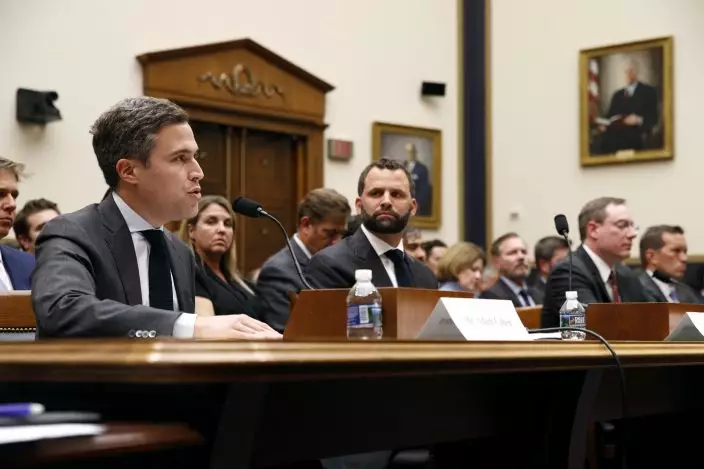
Google Director of Economic Policy Adam Cohen, left, testifies during a House Judiciary subcommittee hearing, Tuesday, July 16, 2019, on Capitol Hill in Washington. (AP PhotoPatrick Semansky)
An afternoon panel of the House Judiciary Committee focused on whether it's time for Congress to rein in these companies, which are among the largest on Earth by several measures. Central to that case is whether their business practices run afoul of century-old laws originally designed to combat railroad and oil monopolies.
For some legislators, mostly Democrats, those laws are in need of updates or at least more stringent enforcement. Ultimately such action could lead to breaking up big online platforms, blocking future acquisitions or imposing other limits on their actions.
Subcommittee chairman David Cicilline, a Rhode Island Democrat, charged that technology giants had enjoyed "de facto immunity" thanks to current antitrust doctrine, which typically equates anticompetitive behavior with higher prices for consumers. That allowed them to expand without restraint and to gobble up potential competitors, he argued, creating a "startup kill zone" that prevents smaller companies from challenging incumbents with innovative services and technology.
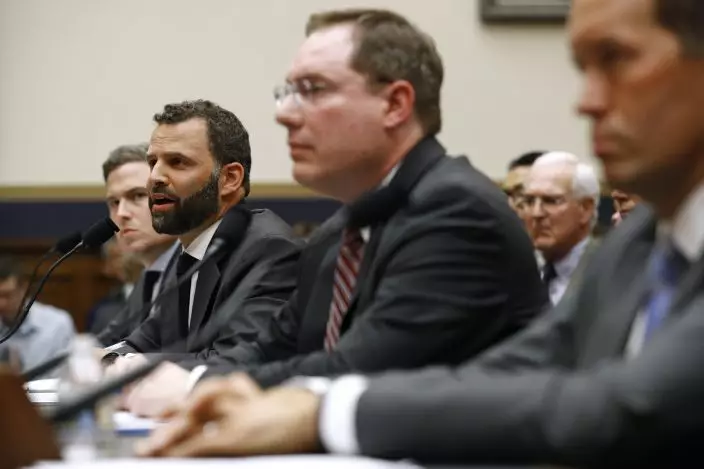
Facebook Head of Global Policy Development Matt Perault, second from left, testifies alongside Google Director of Economic Policy Adam Cohen, back left, Amazon Associate General Counsel Nate Sutton, second from right, and Apple Vice President for Corporate Law and Chief Compliance Officer Kyle Andeer during a House Judiciary subcommittee hearing, Tuesday, July 16, 2019, on Capitol Hill in Washington. (AP PhotoPatrick Semansky)
A panel of four mid-level executives from the companies countered that their firms continue to innovate, that they face vigorous competition on all fronts — including from one another — and, perhaps most of all, that they were not monopolists in any way, shape or form.
Facebook, for instance, has argued that it is not a monopoly because it has many competitors in businesses as diverse as private messaging, photo sharing and online advertising.
So Democratic Rep. Joe Neguse of Colorado asked Facebook's head of global policy development, Matt Perault, to name the world's largest social network by active users. (It is Facebook.) When Perault said he couldn't, Neguse ticked off four of the six largest — Facebook, Facebook Messenger, Instagram and WhatsApp — and had Perault verify that all are owned by Facebook.
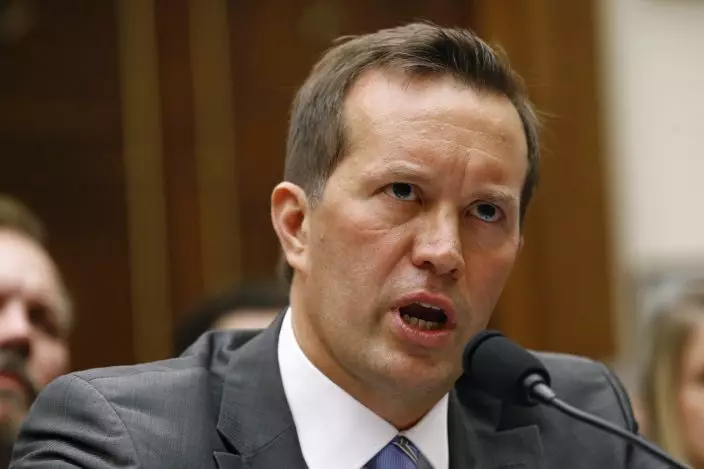
Apple Vice President for Corporate Law and Chief Compliance Officer Kyle Andeer testifies during a House Judiciary subcommittee hearing, Tuesday, July 16, 2019, on Capitol Hill in Washington. (AP PhotoPatrick Semansky)
"We have a word for that and that word is monopoly, or at least monopoly power," Neguse said.
The company representatives didn't help their case by pleading ignorance on multiple occasions. Google's director of economic policy, Adam Cohen, said he was "not familiar" with how much Google pays Apple for the right to supply the default search engine for Safari on iPhones. (Rep. Jamie Raskin, a Democrat from Maryland, said It was $9 billion in 2018 and $12 billion in 2019.) Cohen also said he was "not familiar" with allegations of widespread fraudulent listings on Google Maps.
Amazon also faced some pointed questioning. Cicilline asked Nate Sutton, an associate general counsel at the online retailer, whether it uses the data it collects about popular products to direct consumers to Amazon's own in-house products.
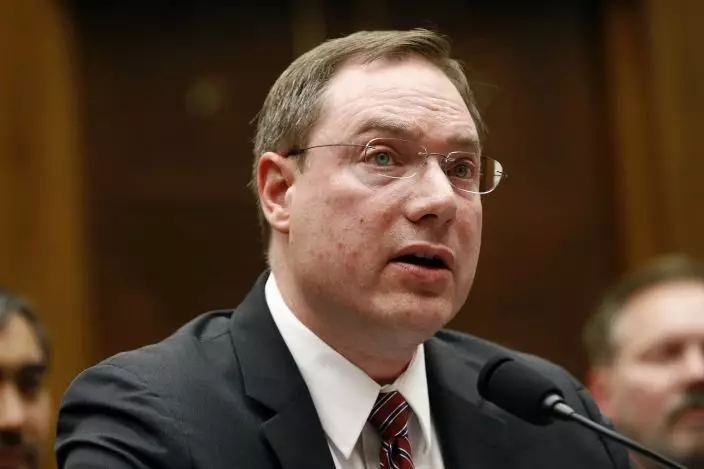
Amazon Associate General Counsel Nate Sutton testifies during a House Judiciary subcommittee hearing, Tuesday, July 16, 2019, on Capitol Hill in Washington. (AP PhotoPatrick Semansky)
Sutton said the company doesn't use third-party sellers' data to "directly compete" with them. Cicilline, affecting disbelief, twice reminded Sutton that he was under oath. "Amazon is a trillion-dollar company that runs an online platform with real-time data," he said.
Expert witnesses suggested it might be time to reassess antitrust policy. Timothy Wu, a law professor at Columbia University who has advocated for more expansive antitrust enforcement, noted concerns about a fall in the number of startups being formed, and wondered aloud whether the U.S. will remain a place where startups thrive and launch new industries.
Fiona Scott Morton, a Yale economics professor, argued that stifled competition has hampered innovation and hurt both smaller businesses and consumers, who have no choice but to surrender their privacy and watch more advertising.
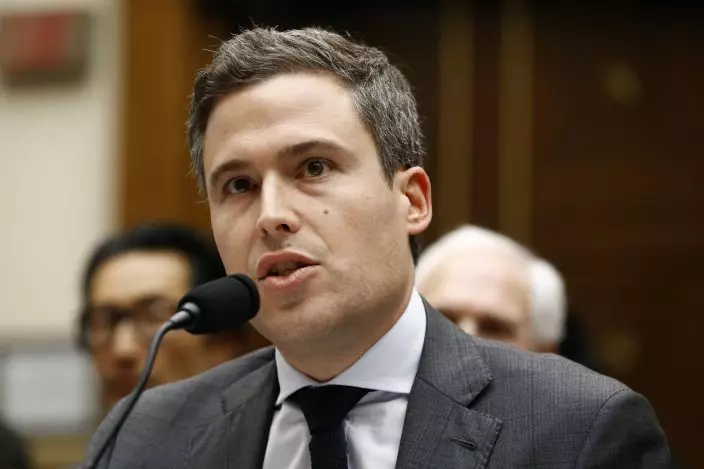
Google Director of Economic Policy Adam Cohen testifies during a House Judiciary subcommittee hearing, Tuesday, July 16, 2019, on Capitol Hill in Washington. (AP PhotoPatrick Semansky)
Others, mostly Republicans, rejected what they described as a big-is-bad approach in favor of keeping antitrust enforcers narrowly focused on protecting consumers when there's clear evidence of harm such as price gouging.
Attorney Maureen Ohlhausen, a former Republican commissioner and acting chairwoman of the Federal Trade Commission, said the government can still protect against anticompetitive behavior without "reducing the focus on consumer welfare." She warned against "drastic" steps such as breakups that carry "serious risk of doing more harm than good for competition and consumers."
Earlier in the day, a Facebook executive appeared before a Senate panel to defend the company's ambitious plan to create a digital currency and pledged to work with regulators to achieve a system that protects the privacy of users' data. David Marcus, who leads the Libra project, faced sharp criticism from both Democrats and Republicans.
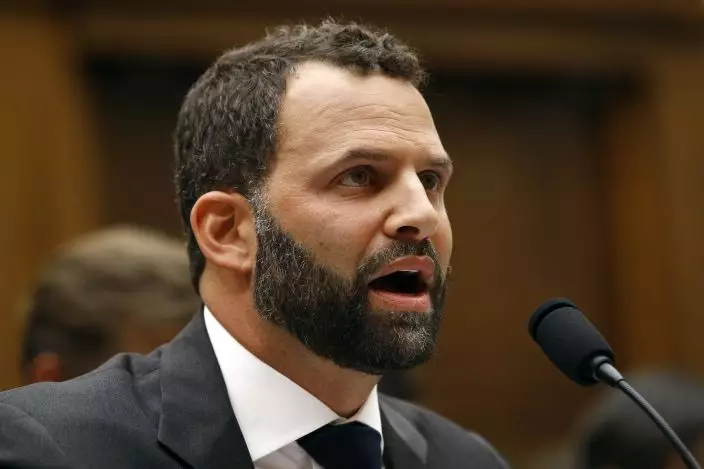
Facebook Head of Global Policy Development Matt Perault testifies during a House Judiciary subcommittee hearing, Tuesday, July 16, 2019, on Capitol Hill in Washington. (AP PhotoPatrick Semansky)
"Facebook is dangerous," asserted Sen. Sherrod Brown of Ohio, the committee's senior Democrat. Like a toddler playing with matches, "Facebook has burned down the house over and over," he told Marcus. "Do you really think people should trust you with their bank accounts and their money?"
Republican Sen. Martha McSally of Arizona said "the core issue here is trust." Users won't be able to opt out of providing their personal data when joining the new digital wallet for Libra, McSally said.
AP business writer Marcy Gordon contributed to this article from Washington, D.C.
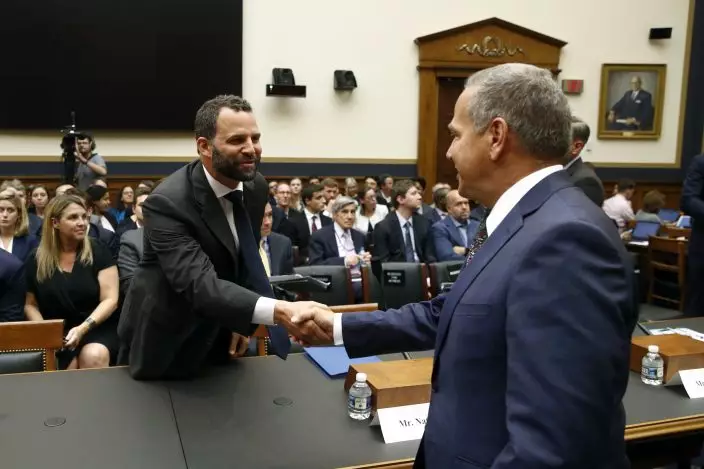
Facebook Head of Global Policy Development Matt Perault, left, shakes hands with Rep. David Cicilline, D-R.I., chair of the House Judiciary antitrust subcommittee, before testifying at a hearing, Tuesday, July 16, 2019, on Capitol Hill in Washington. (AP PhotoPatrick Semansky)
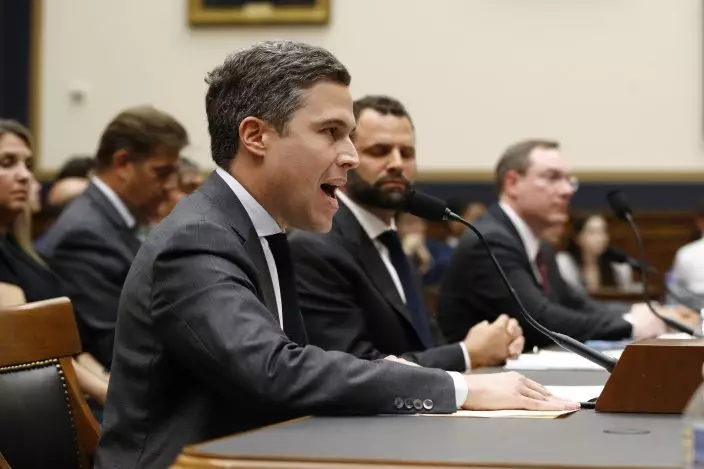
Google Director of Economic Policy Adam Cohen testifies alongside Facebook Head of Global Policy Development Matt Perault, back center, and Amazon Associate General Counsel Nate Sutton, back right, during a House Judiciary subcommittee hearing, Tuesday, July 16, 2019, on Capitol Hill in Washington. (AP PhotoPatrick Semansky)

Google Director of Economic Policy Adam Cohen, left, testifies alongside Facebook Head of Global Policy Development Matt Perault, second from left, Amazon Associate General Counsel Nate Sutton and Apple Vice President for Corporate Law and Chief Compliance Officer Kyle Andeer during a House Judiciary subcommittee hearing, Tuesday, July 16, 2019, on Capitol Hill in Washington. (AP PhotoPatrick Semansky)
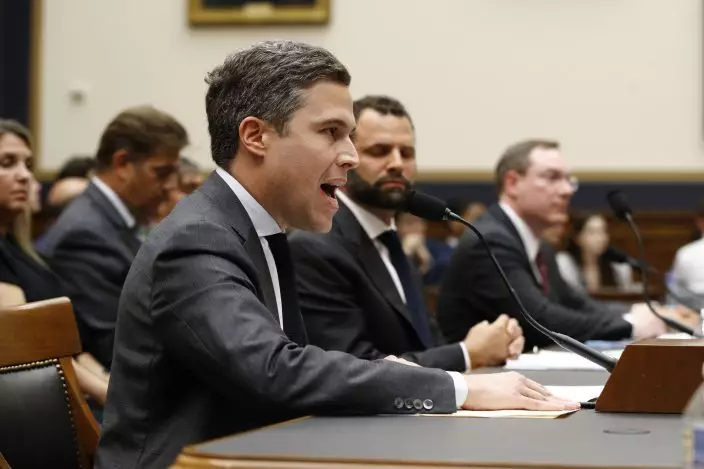
Google Director of Economic Policy Adam Cohen testifies during a House Judiciary subcommittee hearing, Tuesday, July 16, 2019, on Capitol Hill in Washington. (AP PhotoPatrick Semansky)
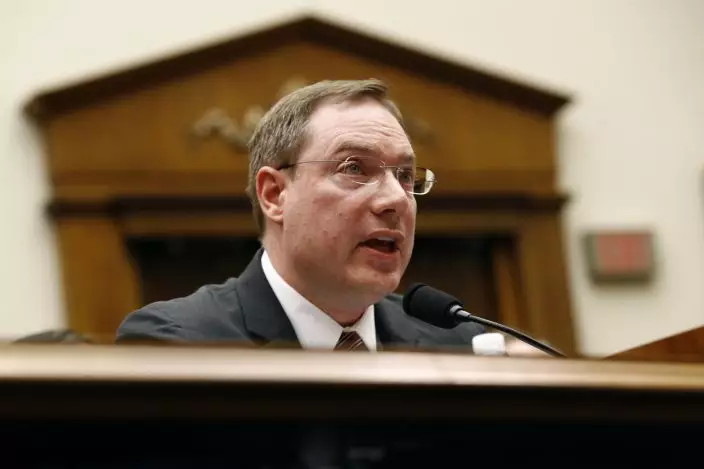
Amazon Associate General Counsel Nate Sutton testifies during a House Judiciary subcommittee hearing, Tuesday, July 16, 2019, on Capitol Hill in Washington. (AP PhotoPatrick Semansky)
DUBAI, United Arab Emirates (AP) — Iranians could call abroad on mobile phones Tuesday for the first time since communications were halted during a crackdown on nationwide protests in which activists said at least 646 people have been killed.
Several people in Tehran were able to call The Associated Press and speak to a journalist there. The AP bureau in Dubai, United Arab Emirates, was unable to call those numbers back. The witnesses said SMS text messaging still was down and that internet users in Iran could connect to government-approved websites locally but nothing abroad.
The witnesses gave a brief glimpse into life on the streets of the Iranian capital over the four and a half days of being cut off from the world. They described seeing a heavy security presence in central Tehran.
Anti-riot police officers, wearing helmets and body armor, carried batons, shields, shotguns and tear gas launchers. They stood watch at major intersections. Nearby, the witnesses saw members of the Revolutionary Guard's all-volunteer Basij force, who similarly carried firearms and batons. Security officials in plainclothes were visible in public spaces as well.
Several banks and government offices were burned during the unrest, they said. ATMs had been smashed and banks struggled to complete transactions without the internet, the witnesses added.
However, shops were open, though there was little foot traffic in the capital. Tehran's Grand Bazaar, where the demonstrations began Dec. 28, was to open Tuesday. However, a witness described speaking to multiple shopkeepers who said the security forces ordered them to reopen no matter what. Iranian state media had not acknowledged that order.
The witnesses spoke on condition of anonymity for fear of reprisal.
U.S. President Donald Trump has said Iran wants to negotiate with Washington after his threat to strike the Islamic Republic over its crackdown.
Iranian Foreign Minister Abbas Araghchi, speaking to the Qatar-funded satellite news network Al Jazeera in an interview aired Monday night, said he continued to communicate with U.S. envoy Steve Witkoff.
The communication “continued before and after the protests and are still ongoing," Araghchi said. However, “Washington’s proposed ideas and threats against our country are incompatible.”
White House press secretary Karoline Leavitt said Iran’s public rhetoric diverges from the private messaging the administration has received from Tehran in recent days.
“I think the president has an interest in exploring those messages,” Leavitt said. “However, with that said, the president has shown he’s unafraid to use military options if and when he deems necessary, and nobody knows that better than Iran.”
Meanwhile, pro-government demonstrators flooded the streets Monday in support of the theocracy, a show of force after days of protests directly challenging the rule of 86-year-old Supreme Leader Ayatollah Ali Khamenei. Iranian state television aired chants from the crowd, which appeared to number in the tens of thousands, who shouted “Death to America!” and “Death to Israel!”
Others cried out, “Death to the enemies of God!” Iran’s attorney general has warned that anyone taking part in protests will be considered an “enemy of God,” a death-penalty charge.
Trump announced Monday that countries doing business with Iran will face 25% tariffs from the United States. Trump announced the tariffs in a social media posting, saying they would be “effective immediately.”
It was action against Iran for the protest crackdown from Trump, who believes exacting tariffs can be a useful tool in prodding friends and foes on the global stage to bend to his will.
Brazil, China, Russia, Turkey and the United Arab Emirates are among economies that do business with Tehran.
Trump said Sunday that his administration was in talks to set up a meeting with Tehran, but cautioned that he may have to act first as reports of the death toll in Iran mount and the government continues to arrest protesters.
“I think they’re tired of being beat up by the United States,” Trump said. “Iran wants to negotiate.”
Iran, through the country’s parliamentary speaker, warned Sunday that the U.S. military and Israel would be “legitimate targets” if Washington uses force to protect demonstrators.
More than 10,700 people also have been detained over the two weeks of protests, said the U.S.-based Human Rights Activists News Agency, which has been accurate in previous unrest in recent years and gave the latest death toll early Tuesday. It relies on supporters in Iran crosschecking information. It said 512 of the dead were protesters and 134 were security force members.
With the internet down in Iran, gauging the demonstrations from abroad has grown more difficult. The Associated Press has been unable to independently assess the toll. Iran’s government hasn’t offered overall casualty figures.

A picture of Ayatollah Ali Khamenei is set alight by protesters outside the Iranian Embassy in London, Monday, Jan. 12, 2026. (AP Photo/Alastair Grant)

In this frame grab from footage circulating on social media shows protesters dancing and cheering around a bonfire as they take to the streets despite an intensifying crackdown as the Islamic Republic remains cut off from the rest of the world, in Tehran, Iran, Friday, Jan. 9, 2026.(UGC via AP)

In this frame grab from footage circulating on social media from Iran showed protesters once again taking to the streets of Tehran despite an intensifying crackdown as the Islamic Republic remains cut off from the rest of the world in Tehran, Iran, Saturday Jan. 10, 2026. (UGC via AP)

FILE - Protesters march on a bridge in Tehran, Iran, on Dec. 29, 2025. (Fars News Agency via AP, File)





















